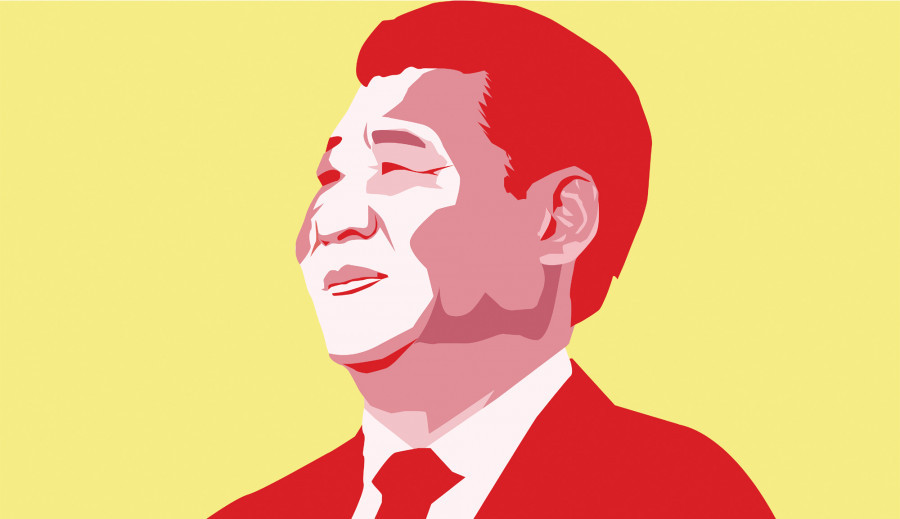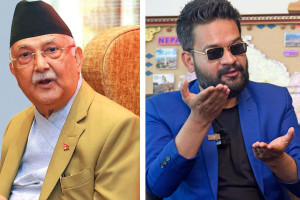Columns
China: A threat to Nepal’s democracy?
Nepal has only recently escaped from the shackles of autocracy—the Xi Thought has no place here.
Mahesh Kushwaha
In a two-day-long programme titled Nepal-China Friendship Symposium, the Communist Party of China (CPC) and the Nepal Communist Party (NCP) recently signed the Nepal-China Memorandum of Understanding. The MoU solidified the NCP’s ties with the CPC and signalled the ruling party’s adoption of the Xi Jinping philosophy, formally known as Xi Jinping Thought on Socialism with Chinese Characteristics for a New Era. The programme, where the Chinese team trained some 200 Nepali communist leaders on Xi Thought, has caused concern among political experts and some leaders of the opposition. The Xi Jinping Thought is neither suitable for our country nor favourable towards democracy, and the ruling party’s submission to it should be a major concern for all. It might well be a big threat to Nepal’s infant democracy.
The Xi doctrine rests upon the Chinese president’s ambition to consolidate his power and control all sectors of society, and it is not suitable for Nepal, which has only recently escaped from the chains of autocracy after years of struggle. Central to Xi’s philosophy is a one-party rule and ‘economic prosperity’ at the expense of freedom and human rights. The communist country has one of the strictest online censorships in the world, with most international social sites banned. The education and mass media sectors experience strict ideological control from the state, whereas academic freedom is significantly curtailed. The recent pro-democracy protests in Hong Kong and the human rights abuses, including several arrests on charges such as ‘unlawful assembly’ and ‘obstructing police’ are examples of China’s authoritarian policies.
Corruption and the ruling party’s inefficiencies are making Nepalis doubt democracy; some even yearn for the monarchy to be reestablished. At such a time, the adoption of Xi Thought only exposes the ruling party’s authoritarian tendencies. Political analysts and commentators have drawn a parallel between the two Communist government’s actions. Like in China, Nepali people have seen their freedom of expression and online engagement restrained; people mocking or even making satirical comments about the government have frequently faced backlash from the state. Some speculate that, like Xi in China, Prime Minister KP Oli is trying to consolidate his party’s rule in Nepal, which may eventually lead to a one-party system.
Nepal boasts of its diversity, pluralism, and non-alignment. The country achieved democracy less than two decades ago, with the joint effort of all the major political parties, and now has a multi-party parliamentary system in place. The democratic federal republic system has also attempted to tackle the long-existing gender and ethnic discrimination and under-representation to some extent. For the neglected and backward groups and communities, the new system promised a more just future. However, it seems as if the Oli-led administration is trying to consolidate his party’s rule, like Xi’s one-party rule in China, through control, nationalism, and nation-building in the name of national security and sovereignty.
Recently, the government attempted to pressure the public to celebrate Constitution Day in a specific manner. It has also ignored the pleas of women and other marginalised groups on citizenship rights. The Oli-led administration has also not shied away from asserting its authority over federal units, either by limiting the provincial and local government’s power to act or by jailing people who speak against the government. All these practices, albeit not to the extreme yet, are quite similar to that of our northern neighbour; China’s control of its so-called ‘autonomous’ regions and the inhuman treatment of its ethnic, religious, and linguistic minorities, such as the Tibetans and the Uighur, are clear features of the Xi Jinping regime.
Moreover, the high-level engagement of the two Communist parties is problematic in itself. As the title of the training program suggests, the engagement shapes the Nepal-China relationship. Indeed, Song Tao, the head of the CPC’s International Liaison Department and the delegation team, assured Prime Minister Oli that China would help Nepal in its path to prosperity. However, at what cost and with what implications? The agreement between the parties and the Nepal Communist Party’s submission to the Xi Thought paves a path for Chinese ‘aid’ and development projects in Nepal. Such infrastructure projects will increase the political goodwill of the communist party among the development-hungry Nepali people, thus fulfilling the MoU’s goal of ensuring the NCP’s strong position in all levels of government. This will create an unfair playing ground for the other political parties competing for electoral seats.
The Chinese ‘aid’ too will invite its own problems. Several African nations, such as Djibouti, have been the victims of China’s ‘Dept-Trap Diplomacy’. Another example is our South Asian neighbour Sri Lanka, which had to lease out the Hambantota port to China for 99 years to settle a portion of its crippling debt to the Asian giant. Nepal may face a similar fate if the ruling Communist party is not conscious of the long-term consequences of such engagements for their short-term gain.
The Nepal Communist Party’s wholehearted welcome of the Chinese ideology has even more severe consequences for Nepali politics, and the opposition parties have to have stay vigilant and critical of such engagements. Instead of surrendering to China, the communist government should, meanwhile, use the Chinese interest in Nepal to also solicit India’s support as well, which will preserve Nepal’s independent decision-making through a more balanced regional cooperation.
***
What do you think?
Dear reader, we’d like to hear from you. We regularly publish letters to the editor on contemporary issues or direct responses to something the Post has recently published. Please send your letters to [email protected] with "Letter to the Editor" in the subject line. Please include your name, location, and a contact address so one of our editors can reach out to you.




 20.12°C Kathmandu
20.12°C Kathmandu















